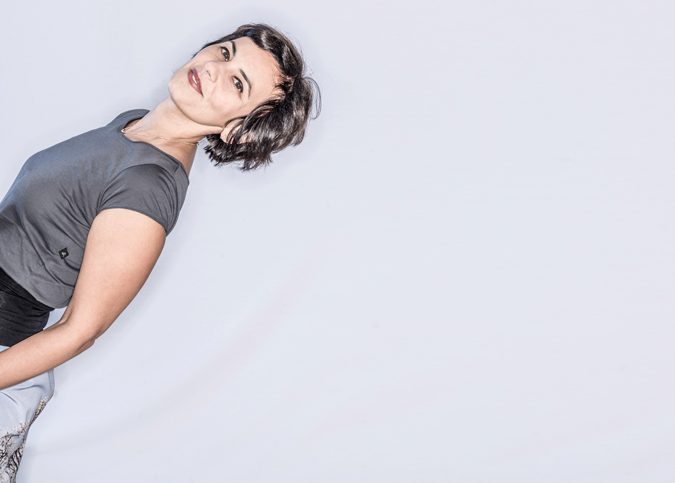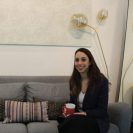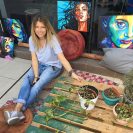With a career in academia, Mai Al-Nakib has always written professionally. Still, she didn’t envision that her fiction debut would arrive as a collection of short stories, let alone an award-winning book. For Mai, The Hidden Light of Objects marked a rediscovery of an earlier sense of herself as a creative writer.
“It feels like I’ve come full circle,” Mai told bazaar. Spending most of her childhood reading, writing and scribbling away in countless notebooks, when it came to The Hidden Light of Objects, Mai relived those experiences by putting her thoughts to paper, expressing her ability to weave the social reality of the region into her fiction. Published as a collection of short stories, The Hidden Light of Objects addresses moments that are often ignored in the lives of people living in Kuwait and the Middle East, and tackles a wide range of issues that have affected life in the region over the last 60 years. The Hidden Light of Objects won the Edinburgh International Book Festival’s First Book Award in 2014, the first short story collection to win in the history of the award. At the festival, the author presented The Hidden Light of Objects on a panel about the short story with American author Tom Barbash. She also participated on two other panels, one about the experience of living and writing in the Middle East, and another organized by the Amnesty International Imprisoned Writers Series, focusing on the plight of Syrian writers. Amongst the 47 writers who were nominated for the First Book Award, readers chose The Hidden Light of Objects as the winner.
While Mai is currently busy writing her first novel, we were eager to discuss how this win may change perceptions about our region. For the first time in a long time, readers abroad seem eager to learn about a version of our region different from the one depicted in mainstream media. More importantly, we are finally witnessing a shift in the way the literary scene views Arab authors who write in English.
The Kuwait-born author left the country as an infant. Upon her return from the US at the age of six, she attended the American School of Kuwait along with her sisters, rare at the time for a young girl whose parents were both Kuwaiti. From there, she went on to study English literature as an undergraduate at Kuwait University and completed her graduate studies in the US, also in English literature. With a PhD from Brown University, Mai’s experience teaching postcolonial studies and comparative literature at Kuwait University defined her role as an academic. Still, she has always envisioned herself as writing creatively on some level. She said, “I do think that I always saw myself as a writer. In graduate school, I began to think of myself as more of an academic than a writer; though, of course, writing is one of the main occupations of academics.”
It was Mai’s personal experience that triggered her return to fiction writing and motivated her to write the short stories. Returning to Kuwait in a post-invasion and, more precisely, a post-9/11 era, the author was left with a sense of dislocation, unfamiliar with the country’s changed social dynamics. She explained, “The Kuwait I returned to was a place that was completely different from the one I grew up in. It was more intolerant, more conservative, and much less adventurous than it had once been, and this felt incredibly disorienting and stifling to me. I needed to open a window onto something else – something I thought I remembered and wanted to bring to life once again, at least in writing. The stories provided me with that opportunity.” While one might accept the idea that personal history and experience will always affect a writer’s work, to conclude that The Hidden Light of Objects is an autobiography would be an incomplete assessment. The series of short stories are enticing fictional tales of life, hope, loss, memory and place – moving far beyond the merely personal.
When Mai first began to write the stories that would make up The Hidden Light of Objects, she didn’t envision that they would form a collection. As she continued to write, however, she noticed a number of recurrences: characters sometimes resurfaced, as did a series of objects, specific words, and a certain tonality. She explained, “The trope of objects is, above all, what holds the stories together. The first-person vignettes – narrated by a recurring character named Mina – is another element that links the stories together. The stories consider how chance objects can trigger forgotten memories or sensations and how that recollection or experience can transform understandings of the past, present, and future. This occurs at a personal level for many of the individual characters, but has implications beyond the characters to society more generally.”
The release of The Hidden Light of Objects has further sparked the literary debate on writing about the Middle East, specifically Kuwait, in the English language rather than in Arabic. The author’s first language happens to be English, so she couldn’t turn to Arabic to write these fictional stories. In any case, defining her audience wasn’t her main priority at the time. It was the reception of the published collection that stimulated this debate, reflecting a clear change in how different generations perceive culture. Mai received generous support from the local literary scene, and the reviews in Kuwaiti newspapers and magazines, both English and Arabic, have been positive. Mai recently addressed this issue at Kuwaiti author and cultural critic Taleb Al-Refai’s Cultural Circle, which she noted was an encouraging experience and helped open a dialogue between the growing number of Arab writers who write in English and those who write in Arabic. Mai affiliates herself with a group of Arab women writers who write in English, “These are writers I read, respect, even teach – writers including Ahdaf Soueif, Selma Dabbagh, Hanan Al-Shaykh, Fadia Faqir, and Diana Abu-Jaber, among others. Another group of writers I feel a great affinity with – Arab or otherwise – are those who express the singular experience of inhabiting the in-between: writers like Kafka and Emile Habibi; Rushdie and Caryl Phillips; Ghassan Kanafani and Assia Djebar. Postcolonial writers, diasporic writers, exilic writers – the writers I most admire, the writers who have shaped my life as a scholar.”
In the process of writing her debut, Mai developed a sense of a very specific audience. She explained, “I had a sense that I was writing, at least in part, to a small group of people, both Kuwaiti and non-Kuwaiti, who came of age in Kuwait around the same time I did. Having this particular group in mind did not affect the way I wrote the stories, but it did give me some pleasure to consider how they might respond.” But once the book was published, Mai found that The Hidden Light of Objects resonated with readers from different places, who seemed to relate to many of the themes presented in the short stories. She said, “Writers write as a way to connect with readers, and it is incredibly gratifying to know that readers from many places seem to be connecting with my book.”
Mai is currently considering having the collection of short stories translated to Arabic. She said, “It’s important to me, as an Arab writer, to have an Arabic-reading audience and a translation would ensure that. On the other hand, I think I would feel a certain vulnerability about having the stories appear in Arabic. Firstly, because it would mean handing over the reigns to someone else, trusting a talented translator to capture the spirit of my book. Secondly, and more importantly, I’m hesitant about having the book translated because I sometimes worry that the content might sound jarring or incongruous to an Arabic-reading audience. Perhaps I’m overthinking it. In any case, there are plans for an Arabic translation, and we’ll see how that goes.”
The Hidden Light of Objects was released by Bloomsbury Qatar Foundation Publishing in the UK and MENA region in April 2014. It will be released in the US in January 2015, and she will be doing a book tour there in February. She’ll be back in March 2015 to participate in the Emirates Airline Festival of Literature in Dubai.
What do you most value in your friends?
Kindness, generosity of spirit, confidence, humor, and loyalty.
What is your idea of perfect happiness?
Lying on a beach in the late afternoon sun, not a care in the world.
What is your greatest fear?
Time passing.
What is the trait you most deplore in yourself?
My capacity to obsess over time passing.
What is the trait you most deplore in others?
Arrogance.
Which living person do you most admire?
I have two: Fredric Jameson and Noam Chomsky.
What is your greatest extravagance?
Travel.
Which words or phrases do you most overuse?
“It’s problematic.”
What is it that you most dislike?
Fanaticisms and extremisms of all stripes.
Which talent would you most like to have?
To run like Mo Farah.
If you could have any job, what would it be?
Full-time writer.
What would you consider your greatest achievement?
The Hidden Light of Objects.
What is your most treasured possession?
That’s a secret!
What is your most marked characteristic?
I tend to be nostalgic. And then I tell myself to snap out of it, only to slip back in.
Where would you most like to live?
Paris or Brooklyn.
What are your favorite words to live by?
To paraphrase Hitchcock, there’s nothing better than a clear horizon.
For more information, visit www.maialnakib.com
Photos courtesy of Chris Close.











